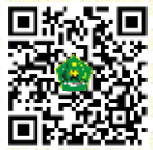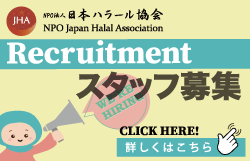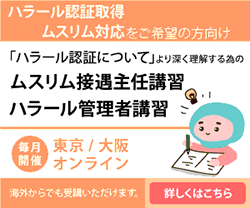1. What is Overseas Approval?
In some Gulf states and Islamic countries in Southeast Asia, government agencies manage halal certification, have domestic laws regarding halal-certified products, and impose import restrictions on halal-certified products. In such countries, there are “halal certification standards” established by government agencies, and halal certification is carried out in accordance with the certification standards. In addition, products imported from overseas are not recognized as halal-certified products unless they are certified by an overseas halal certification body (FHCB) approved by a certification body in their home country. We would like to increase the convenience of companies that obtain certification by recognizing that one halal certificate issued by the Association is valid in as many countries as possible. With this in mind, the Association has been making steady efforts to be recognized as an international certification organization by “establishing certification standards,” “strengthening organizational management,” and “training auditors” in accordance with the requirements of each country. As a result, Japan has become the most Halal certification organization in Japan that receives approval and accreditation from the largest number of countries.
2. Overseas halal certification bodies approved and accredited by the Association
- Acquisition of GO2055-2 accreditation by the Gulf State Certification Body (GAC)
- Acquisition of UAE Certification Body (ESMA) Halal Certification Body Certification Body (ESMA) Acquisition of Mutual Recognition
- Acquisition of Mutual Recognition from Malaysian Government Halal Certification Body (JAKIM)
- Indonesia Mutual Recognition Acquisition of Indonesia Ulamar Council (MUI)
- Indonesia Mutual Recognition Acquisition of The Halal Product Assurance Organizing Body (BPJPH)
- Mutual recognition of the Islamic Council of Singapore (MUIS)
- Mutual recognition of the Central Islamic Organization of Thailand (CICOT)
- Taiwan Taiwan Qingshin Industrial Quality Assurance Certification Association (THIDA) Mutual recognition obtained
- Turkey (HAK) Pending Associations by the world’s halal certification organizations:
- World Halal Food Organization World Halal Food Organization World Member of the Halal Food Council (WHFC)
List of Overseas Approvals and Certifications
| Country | Organization Name | Year of acquisition | Status of Acquisition | Certification Standards | Approval Category | Remarks | |
|---|---|---|---|---|---|---|---|
| 1 | Malaysia | JAKIM | 2012 | Acquired | MS1500:2019 | all | |
| 2 | Indonesia | MUI | 2019 | Acquired | HAS23000 | Raw materials, additives, processing aids, slaughter | |
| BPJPH | 2024 | Aquired | SJPH | Foods and cosmetics | |||
| 3 | Singapore | MUIS | 2013 | Acquired | HAS Singapore | all | |
| 4 | UAE | MOIAT | 2017 | Acquired | UAE. GSO2055-1 | Processed foods, slaughter, animal feed, chemistry and biochemistry (food additives, flavorings, cosmetics, pharmaceuticals) |
Slaughter acquisition June 2021 |
| 5 | Gulf States | GAC | 2016 | Acquired | GSO2055-1 | Processed foods, animal feed, chemistry and biochemistry (food additives, flavorings, cosmetics, pharmaceuticals) |
Excludes slaughter |
| 6 | Thailand | CICOT | 2018 | Acquired | – | all | |
| 7 | Taiwan | THIDA | 2020 | Acquired | – | all | |
| 8 | Turkey | HAK | 2024 | Aquired | OIC-SMIIC-1 | Production of (Bio) Chemicals |
3. Transition to approval in Indonesia
In Indonesia, the private organizations MUI (Indonesian Ulama Council) and LPPOM-MUI (Food, Pharmaceutical and Cosmetic Inspection Organization of the Indonesian Ulama Council) have been conducting halal certification audits and issuing certifications, but in 2014, in the JPH Law (Halal Product Assurance Act), It was stipulated that BPJPH (Halal Product Assurance Implementation Agency) under the jurisdiction of the Ministry of Religious Affairs, which is a government agency, will issue halal certification, and in 2019, the halal certification business was transferred from MUI to BPJPH.

4. Difference between approval and accreditation, necessity of mutual recognition
Organizations with jurisdiction over halal certification systems in each country, such as JAKIM (government agency) in Malaysia, BPJPH (government agency) in Indonesia, MUIS (Semi-Civil Half Government) in Singapore, and CICOT (Semi-Civil Half Government) in Thailand, approve overseas halal certification organizations (FHCB) based on their own standards. On the other hand, ESMA/ENAS in the UAE, the Gulf Accreditation Center (GAC), a collection of accreditation bodies from seven Gulf countries, and Komite Akreditasi Nasional (KAN), which collaborates with BPJPH in Indonesia to approve overseas certification bodies, are accreditation bodies, and in Japan, they are like the Japan Conformity Accreditation Association (JAB). Unlike the former (approval body), which approves based on its own standards, the latter (accreditation body) certifies whether or not the halal certification body of each country conforms based on ISO/IEC17065 etc. As a recent trend, the recognition that certification based on ISO is very effective in measuring the quality of halal certification organizations is spreading among approval bodies, and approval bodies are also actively incorporating certification standards based on ISO into their own standards. At BPJPH in Indonesia, overseas halal certification organizations that have not received accreditation from the above-mentioned accreditation organizations (ESMA/ENAS, GAC) take the approach of approving + accrediting in collaboration with BPJPH x KAN. For accreditation performed by GAC, ESMA, KAN and others, standards such as accreditation standards for halal certification bodies + ISO/IEC17065 (requirements for organizations that certify conformity assessment, products and services) and ISO/IEC17021 (requirements for conformity assessment management system audits and certification bodies) are used.
ISO alone would prove that it is a certification body that has cleared international standards, but halal certification includes many things that are different from other industrial standards, especially those that are familiar with Islam, the fact that it is a Muslim organization, and the fundamental requirements of halal. Therefore, halal accreditation bodies such as GAC use ISO and its country’s own halal certification standards during certification to cover the special requirements of halal in certification. Recently, there has been an increase in the number of cases where major non-Muslim ISO accreditation organizations in Europe and the United States implement halal certification, but basically non-Muslim certification organizations are not approved and certified as halal certification organizations by halal certification bodies such as GAC. In recent years, halal certification has spread as a tool that can be advantageously utilized by the halal industry, and the number of halal certification organizations is increasing worldwide, and accordingly, the need to confirm the credibility of certification organizations is increasing. From 2015 to 2016, Saudi Arabia and Indonesia in 2019, Thailand in 2020, and the latest Turkey in 2023 (tentative), we have enacted laws such as limiting halal-certified products imported into our home country to certified products approved by overseas halal certification bodies approved by our own certification bodies and have started to establish import restrictions. Although there is a grace period before the enforcement of these laws, halal certification organizations in each country obtain approval according to their schedule, and after obtaining approval, they are busy with the work of incorporating it into the actual certification audit.






